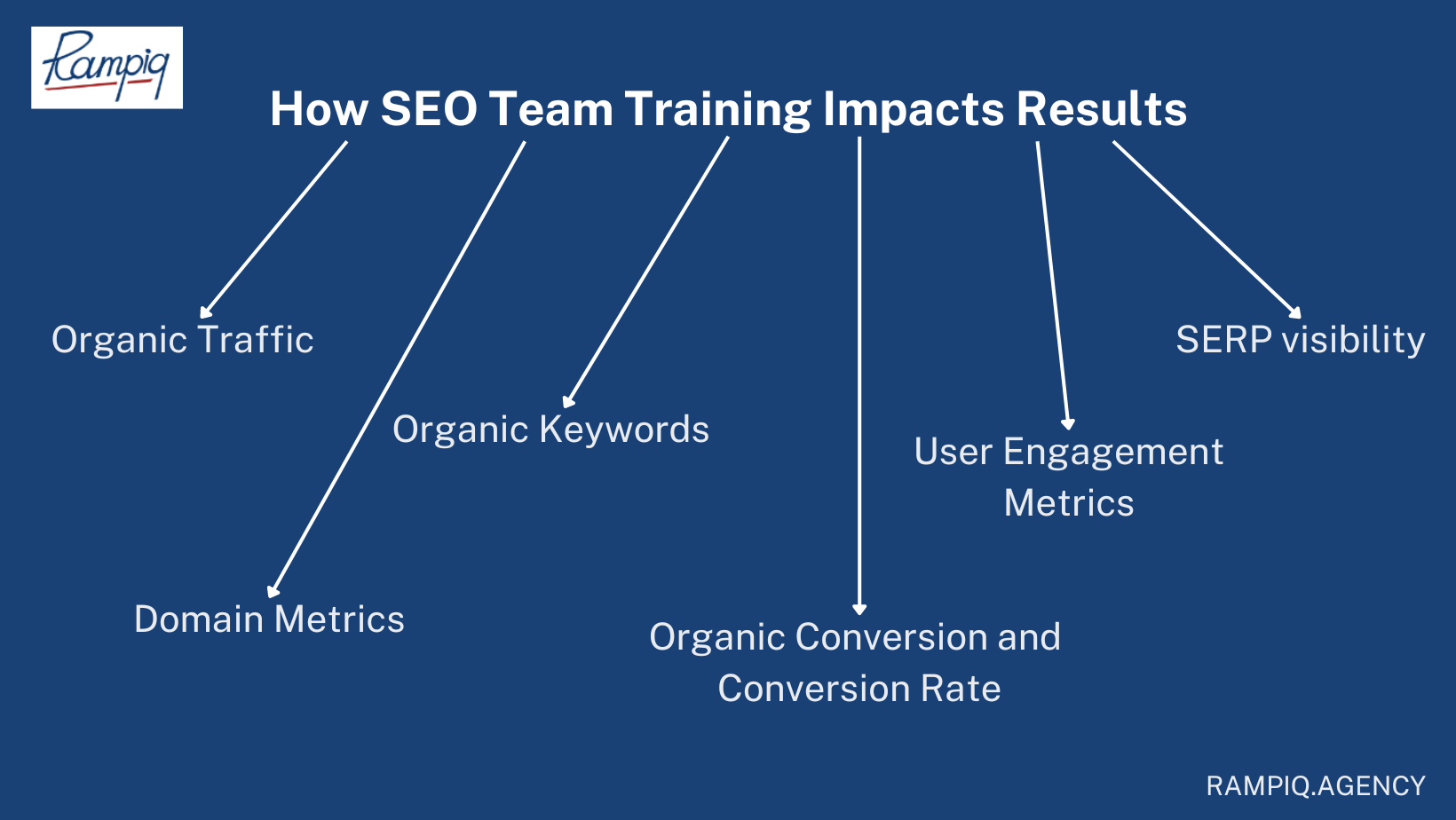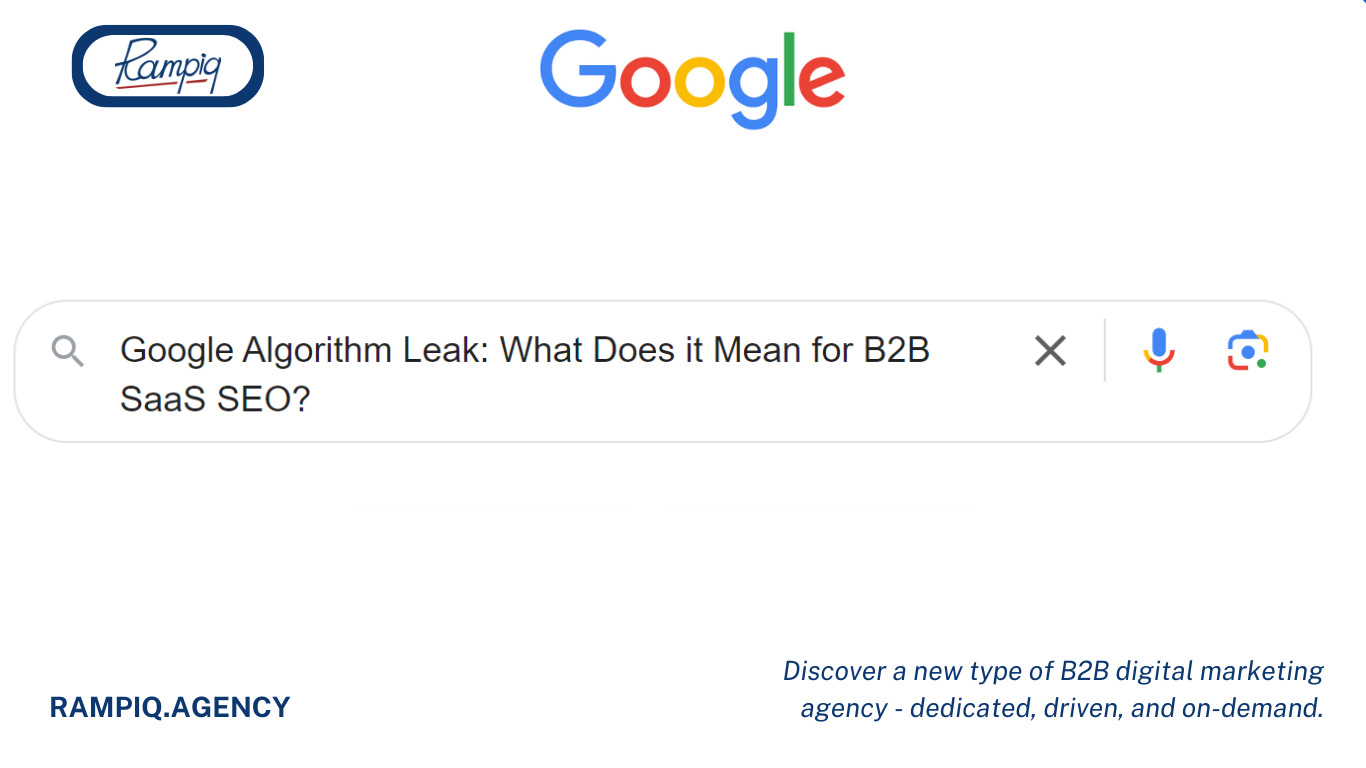Why Consider SEO Trainings and Workshops for Your In-House B2B Team?
Inhouse SEO training equips your team with practical skills, reducing the learning curve for implementing effective strategies With search engine algorithms constantly evolving, SEO training enables your team to always keep up with the latest search engine algorithm updates, technologies, and trends.
- Cost-Effectiveness: In-house teams, post SEO training, become an invaluable resource with a broadened skill set, which eliminates the need for recurrent outsourcing expenses. If your team can handle tasks like keyword research, on-page optimization, and content creation in-house, you save substantially on external agency fees
- Responsive to Algorithm Changes: Well-trained in-house teams gain the agility to immediately respond to search engine algorithm changes. For instance, if Google updates its ranking factors, a trained in-house team can swiftly adjust strategies to align with the new criteria.
- Long-Term Commitment: Investing in in-house SEO training often cultivates a sense of loyalty among team members. They appreciate the investment in their professional growth, fostering a commitment to your company’s success. This loyalty can lead to a longer-term commitment to your organization – reduced turnover not only contributes to a stable work environment but also saves costs associated with recruiting, onboarding, and training new staff.
- Sense of Ownership: In-house SEO training fosters a sense of ownership among team members who actively participate in their skill development – a trained team is more likely to be motivated and dedicated. Knowing that their efforts directly contribute to the success of the company, they are driven to achieve and exceed goals.
- Understanding Company Goals: Trained teams can craft SEO approaches that resonate with your company’s unique goals. Suppose your company is focused on community engagement – in that case, your in-house team can create content and engagement strategies that prioritize community-building, setting your brand apart.
Who Should Attend SEO Workshops for In-Teams?
High-quality SEO workshops for teams are designed to improve not only your SEO specialists, but a wide range of other team members, some of whom may not even have a direct connection to marketing. That is because when all or most of your core team is aware of the SEO basics, your marketing approach will become much more holistic.
Namely, we recommend that the following team members be involved in SEO training in at least some capacity:
- Copywriters: SEO copywriting training can delve into advanced keyword research, crafting content that not only engages users but also aligns with targeted SEO goals. They learn to create SEO-friendly meta tags, headers, and incorporate strategic keywords naturally. This dual focus ensures that the content not only resonates with the audience but also enhances the website’s search engine visibility.
- Analytics Department: In workshops, they can deepen their understanding of key performance indicators (KPIs) related to SEO. This includes tracking organic traffic, monitoring keyword performance, and analyzing user behavior on the site. Advanced analytics skills enable the team to make data-driven decisions, continually optimizing the website for better search engine performance.
- PPC Specialists: While primarily focused on paid advertising, PPC teams can benefit by understanding the synergy between organic and paid strategies. In SEO workshops, they can explore the impact of organic rankings on overall digital marketing performance. This knowledge allows for a more integrated approach, aligning paid campaigns with organic efforts for maximum visibility and a cohesive online presence.
- Web Designers: Web designers are the architects of a website’s visual appeal and user interface – they can enhance their skills by learning to design with SEO in mind. This involves creating responsive designs for mobile optimization, improving page loading speed, and implementing structured data markup for search engine understanding.
- Web Programmers: Web programmers, responsible for the technical backbone of a website, can leverage SEO workshops to delve into advanced coding practices. Learning about server-side rendering, optimizing website architecture for crawlability, and implementing schema markup are valuable skills. Additionally, understanding how JavaScript impacts SEO can empower programmers to create dynamic, SEO-friendly websites, improving overall visibility and ranking potential.
- Web Project Managers: Workshops empower them to set realistic SEO goals, allocate resources effectively, and track key performance indicators. They learn to integrate SEO timelines into project schedules, ensuring that optimization efforts align with broader project objectives. This strategic approach enhances the efficiency of SEO implementations within the project management framework.
How SEO Team Trainings Impact Results
The positive impact of SEO training is multi-faceted; it can improve a vast number of KPIs for your website, including traffic volumes, conversion rate, average positions in search results ranking pages, and many more.

To be more specific, let’s break down the possible benefits:
- Organic Traffic: SEO workshops empower team members to implement advanced strategies for enhancing organic traffic. Understanding the latest algorithms, keyword trends, and content optimization techniques allows the team to create a robust SEO strategy. Practical exercises and case studies presented during workshops equip team members with actionable steps to attract targeted organic traffic, resulting in increased visibility and reach.
- Domain Metrics: A well-trained SEO team positively influences domain metrics – workshops delve into the intricacies of backlink strategies, technical SEO, and website architecture. As a result, the team can implement practices that boost domain authority, trust, and overall domain metrics. This enhanced authority contributes to improved search engine rankings, creating increased visibility and credibility.
- Organic Keywords: Inhouse SEO workshops provide teams with the tools to conduct in-depth keyword research, exploring not only high-volume keywords but also long-tail and intent-focused keywords. Through practical exercises, teams learn to align keywords with user intent, creating content that resonates with the target audience. The result is a well-optimized website that ranks for a diverse set of relevant keywords, maximizing organic reach.
- Organic Conversion and Conversion Rate: Teams gain insights into optimizing landing pages, improving website user experience, and aligning content with conversion goals. Practical exercises on A/B testing and user journey mapping enable teams to implement changes that positively impact organic conversion rates, translating increased traffic into tangible business outcomes.
- SERP Visibility: SEO workshops for teams focus on understanding search engine result page (SERP) dynamics. Teams learn to analyze SERP features, leverage structured data, and create compelling meta tags. Practical insights from workshops guide teams in crafting content that stands out in SERPs, improving click-through rates and overall visibility.
- User Engagement Metrics: SEO workshops delve into creating engaging and shareable content, optimizing multimedia elements, and fostering a positive user experience. Teams learn to interpret user behavior data, refine content strategies, and enhance engagement metrics such as time on site, bounce rate, and social shares. The outcome is a website that not only attracts users but also keeps them actively engaged.
Collaborating With an External SEO Team or Consultant
External SEO teams can be a great solution if you feel that your internal specialists are not maximizing your marketing potential. They often excel in niche areas, such as local SEO, technical audits, or advanced link-building strategies – collaborating brings in-depth expertise that goes beyond general knowledge. For instance, your team may benefit from specialized workshops focusing on hyper-local optimization or the nuances of schema markup.
External consultants also offer an unbiased viewpoint. They can conduct thorough audits, identifying overlooked opportunities and suggesting improvements – expect detailed analyses of your current strategy, accompanied by specific recommendations for improvement tailored to your industry and competitive landscape.
Additionally, the external specialists will bring to the table the know-how of using the most advanced marketing tools – they can share with you how to conduct technical adults using Ahrefs, or their hands-on keyword gap analysis experience with tools like SEMrush.
The most important thing is knowing how to choose the right external marketing team – make sure their pricing is adequate, their expertise is certified and their other clients are positive about the experience of working with them.
Rampiq’s Approach to In-House B2B SEO Training
Our SEO training approach is based on two key principles: being holistic and being practical. Having augmented many internal marketing teams, we understand the importance of each component of SEO and we ensure that they are all comprehensively covered, be it local, technical, on-page, or off-page SEO.
Local SEO for B2B IT & SaaS companies
Our training emphasizes the development of local link-building tactics and strategies for fostering positive local online reviews. Local SEO has been traditionally associated with B2C niches, however Rampiq’s deep expertise tailors these practices to the needs of B2B IT and SaaS companies.
The team holds in-depth sessions on how to differentiate authoritative local citations from poor ones, maximize the efficiency of your link-building efforts, and maintain consistent business information across directories and platforms.
We also focus on creating and optimizing Google Business profiles, managing customer reviews, and utilizing features like posts and Q&A to showcase aspects important for B2B projects. We emphasize the significance of consistent GMB activity, be it adding more photos, updating your Products section, or asking your past and current clients to leave their reviews on your profile.
As a result, trainees can anticipate heightened visibility in local search results, translating to increased foot traffic and engagement within the local community.
Technical SEO for B2B projects
Our technical SEO training pays close attention to implementing technical SEO improvements that not only align with search engine algorithms but also enhance the overall user experience. Unlike many other agencies, we treat technical SEO as an ongoing effort and focus our training on how to identify, recognize, and fix key technical SEO issues.
To begin with, we introduce vital tools for technical SEO audits such as Google Search Console, PageSpeed Insights, Ahrefs, and SEMRush. They are instrumental in identifying critical issues such as orphan pages, 404 errors, slow loading speed, and many others that actively harm the website’s ranking.
We also delve deep into the concepts of website crawling and indexing mechanisms, including XML sitemaps, robots.txt, and canonical tags, so that teams can understand how search engines read websites and assign rankings to them.
Lastly, we show techniques and activities for resolving the above issues so that teams can expect improved site performance, faster loading times, and ultimately, higher search engine rankings.
On-Page SEO – B2B best practices implementation
We hold comprehensive sessions on effective keyword research, exploring both short- and long-tail keywords, and understanding user intent. Our training delves into real-world scenarios, where the focus is on creating a holistic content strategy that not only aligns with SEO objectives but also resonates with the target audience.
The superpower of this part of the training comes in enabling in-house B2B teams to regularly update the keywords strategies and focus on the right stages of the user journey in their content effort.
We also explore content audits, aligning existing content with the latest SEO best practices – techniques for optimizing on-page content, including keyword integration, meta tag, and content structure updates. As a result, teams can anticipate enhanced visibility in search results through targeted on-page optimization, leading to increased organic traffic. We provide in-house teams with hands-on instructions and documentation examples that they can proactively use in their daily work.
Off-Page SEO training for B2B teams
Our team performs in-depth training on ethical and effective link-building techniques, encompassing outreach, guest posting, and relationship-building. We specifically tailor our SEO workshops to the needs of B2B IT companies, both product and service ones.
Link building for SaaS can be tricky, so we help our trainees navigate this space with maximum value for the invested time.
We also stress the importance of leveraging social media for improved off-page SEO, emphasizing shareable content creation and community engagement.
We foster practical skills in acquiring high-quality backlinks and hands-on promotion of SEO-friendly content, from which teams can anticipate improved website authority, higher search rankings, and increased credibility.
Read more on our thoughts on off-page and content marketing activities, and how they can help build your brand’s authority.








